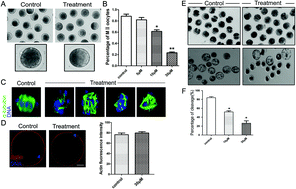Altered oxidative stress, apoptosis/autophagy, and epigenetic modifications in Zearalenone-treated porcine oocytes†
Abstract
Zearalenone (ZEN) is a non-steroidal estrogenic mycotoxin that is frequently detected in animal feed and causes serious reproductive problems in animals, particularly in pigs. However, little is known about whether ZEN affects oocyte quality. In this study, we explored possible mechanisms for the toxic effects of ZEN on pig oocytes. We cultured porcine oocytes to maturation in media with different ZEN concentrations (5–30 μM), after which we analyzed oocyte oxidative stress status, autophagy, early apoptosis, and epigenetic modifications by immunofluorescence, quantitative real-time PCR analysis and western blot approaches. ZEN affected porcine oocyte maturation and early embryonic development. In ZEN-treated oocytes, the ROS (reactive oxygen species) levels increased, which indicated that oxidative stress had occurred. ZEN-treated oocytes also exhibited increased rates of autophagy and apoptosis. Regarding epigenetic modifications, 5mC levels, H3K9me3, H3K27me3, and H3K4me2 expression and the related gene levels were increased in ZEN-treated oocytes, which indicated that DNA methylation and histone methylation levels had changed. Collectively, these observations suggested that a broad range of toxic effects are exerted by ZEN and we propose that oxidative stress, autophagy, early apoptosis, and aberrant epigenetic modifications are possible reasons for ZEN associated reductions in porcine oocyte and embryo developmental competence.


 Please wait while we load your content...
Please wait while we load your content...